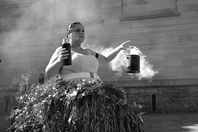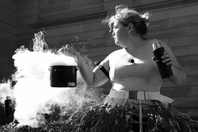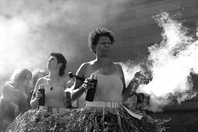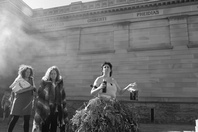The Unbound Collective
Kaurna Yarta, Adelaide. Yankunytjatjara, Western Desert region
2019
Displayed 2019 at Museum of Contemporary Art Australia
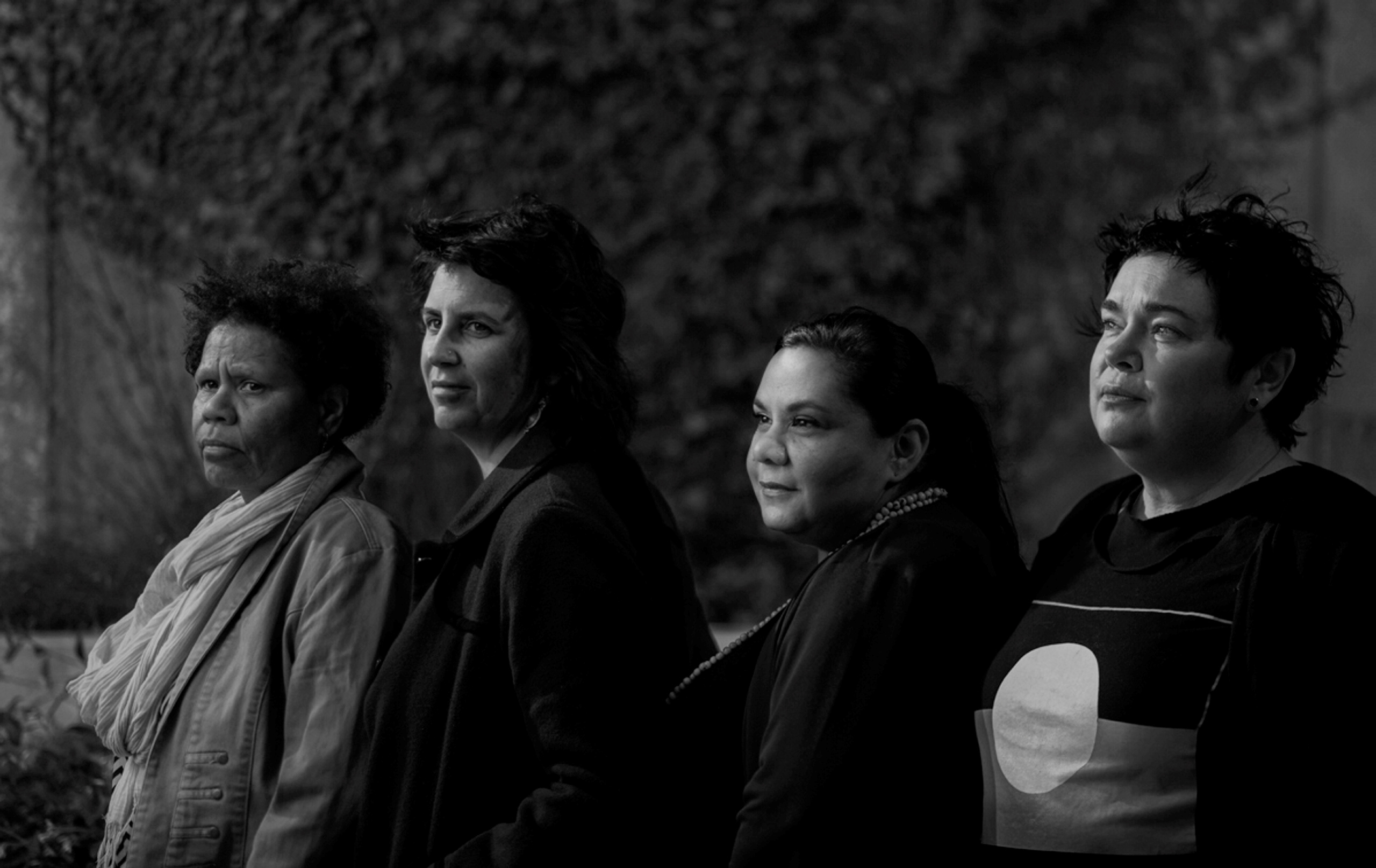
The Unbound Collective
left to right:
Faye Rosas Blanch
Born 1959, Atherton Tablelands, Queensland. Lives and works on Kaurna Yarta, Adelaide. Mbararam/Yidinyji, Rainforest region
Natalie Harkin
Born 1970, Kaurna Yarta, Adelaide. Lives and works on Kaurna Yarta, Adelaide. Narungga, Spencer region
Simone Ulalka Tur
Born 1971, Kaurna Yarta, Adelaide. Lives and works on Kaurna Yarta, Adelaide. Yankunytjatjara, Western Desert region
Ali Gumillya Baker
Born 1975, Kaurna Yarta, Adelaide. Lives and works on Kaurna Yarta, Adelaide. Mirning, South-West region
The Unbound Collective seeks to engage Aboriginal community members who historically have been contained and excluded within and beyond the mortar and boundaries of Adelaide’s so-called cultural precinct, and to speak back to colonial institutions of power as dominant repositories of knowledge. Each member of the collective singularly and collectively addresses the notions of ethical practice and responsibility, enacting memory and storytelling, and offers an interrogation of state colonial archives. They explore complex ideas around being free or bound, and offer poetic, performance and music-based investigations of sovereign identity and (re)representation.
Artist text
by Romaine Moreton
(Ali Gumillya Baker, Faye Rosas Blanch, Natalie Harkin & Simone Ulalka Tur)
Four women enter the gallery space. They move softly, quietly. The carriage of light, the vibration of voices, and the spectre of Indigenous womanhood gently moving through the western coloniality of power, represented here by the gallery itself. They carry small projectors, will sing to the portrait of Captain Cook, and speak poetry to the outdated, violent, racist ideas of western colonialism. The women are captivating with their stillness, enduringness. Their bodies in all their beauty challenge narratives historically controlled by anthropologists, such as Norman Tindale, who led expeditions out of the South Australian Museum. The static nature of scientific texts such as Tindale’s is juxtaposed to the fluid movement of The Unbound Collective – Aboriginal women who culturally transmit through gesture and song, using light to project ancient knowledge into the living present. The spectre, the audience expects, is an Indigenous haunting, a return of an Indigenous, unyielding presence. However, this ancestral presence, invoked by the bodies of four Aboriginal women, is here to remind us that in Indigenous cosmology, everything is in flux, and all things are continuous. They make that which is invisible, visible.
The Unbound Collective’s Sovereign Acts IV: Object (2019) is an interrogation of the passive condition of the object, and an active protest of objectification. The performers physically and conceptually move within this binary, their identities bound and unbound. The Unbound Collective move together as an embodied single, complex thought, where the living flesh and the archive are caught in a dance. The Unbound Collective conducts a dialogue with the cold, hard fixity of colonial structures and patriarchal order, their unquiet tranquillity instantaneously destabilising the rigid structures of institutionalism. Small projectors in their hands marking their way, The Unbound Collective bring mystery to nomology, interrupt the scientific gaze, and disturb colonial authority. The Unbound Collective come to repatriate the named and un-named Aboriginal people held in institutional collections, augmenting a repatriation process that is simultaneously an act of love. The women walk carefully, their light-bearing forms moving through moribund spaces, weaving kinetic maps that reinscribe ancestral presence back into place.
Sovereignty is quiet. Sovereignty is intimate. Sovereignty is love. And Sovereign Acts IV: Object puts love back into place. The Unbound Collective remind us, let us not be still in the fixity of the archive. Let us move. Bound. Unbound. Abound. As an Aboriginal woman, I feel safe in the protest of The Unbound Collective and their shedding of objectification, for I know they have held each word, each stone, each mortar, each idea, each love act, each act of love, every sovereign moment, like an Ancestor repatriated. Sovereign Acts IV: Object is a testimony to the collectives of women, the value of conversation and knowingness in the presence of the text, and the text like a tomb is cracked open to free the living essence of all that is ancient and unyielding. The Unbound Collective show us that Indigenous presence is enduring, and erasure cannot be affected by incarceration, quantification or dissection. The ancient is soft, malleable and always weaving itself back into place. The old people are not absent, nor are they silent, and they are returned to the living presence through The Unbound Collective’s performance of sovereign love.
The Unbound Collective
5min
The Unbound Collective discuss their performance for The National 2019.
